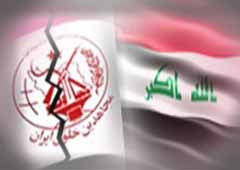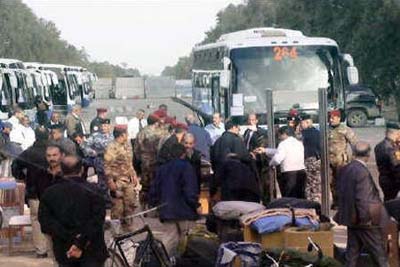U.S. Guarded Embattled Movement’s Camp
Iraq’s national security adviser said Friday that the government intends to move an Iranian opposition group from its sanctuary near the Iranian border to a location where leaders and”brainwashed cult members”will be separated and the latter”detoxified.”
Mowaffak al-Rubaie’s remarks about the future of the Mujaheddin-e Khalq, or MEK, were his most detailed to date on how his government intends to deal with an issue that has been an irritant in relations between Iraq’s government, which has built close ties with Iran, and the U.S. government. The group received support from Saddam Hussein’s government and has been designated a terrorist organization by the State Department, but U.S. officials credit the MEK with providing information about Iran’s nuclear program.
The Iraqi government’s resolution of the conundrum is likely to shed light on how an increasingly sovereign Iraq will handle such vexing problems, and is likely to speak volumes about the extent to which Prime Minister Nouri al-Maliki is influenced by Iran.
Members of the group”should understand that their days in Iraq are numbered,”Rubaie told Western journalists at a briefing in the Green Zone.”We are literally counting them.”
Iraqi officials, including Maliki, have in recent months publicly lambasted the group, generally during or after official visits to Iran.
The U.S. military has protected the group’s camp in Iraq since the 2003 invasion. It handed over nominal control of the outer perimeter to Iraqi security forces in February but said it is keeping a contingent there to ensure that group members are treated humanely.
At one point in his remarks, Rubaie said Iraq would not forcibly deport MEK members because”we are a civilized country.”But later, he said the Iraqi government would have a”thick skin”when it came to any negative press or international outcry generated by the eventual repatriation of members.
“The party is over for them. The party is over for coalition protection for them,”he said, referring to the U.S. military.
A spokesman for the group, Mohammad Mohaddessin, said in a statement that residents of Camp Ashraf, which is 40 miles north of Baghdad,”will never leave their home”and warned that Rubaie’s plan is”setting the stage for a human catastrophe.”
Rubaie did not indicate when or how the Iraqi government will expel the people at Ashraf. He said the government is considering facilities in western and southern Iraq to house the camp’s 3,418 residents while it studies its options.
Rubaie said the government hopes to wean”brainwashed cult members”from the sway of the 25 or so leaders at Ashraf before they are repatriated.
Rubaie, citing numbers he obtained from the U.S. military, said Camp Ashraf’s population includes 11 Canadians, five Americans, four Swedes, three Dutch and three Britons. Hundreds more have legal residency permits issued by France, Germany and other Western countries, he said. But ascertaining the identity and nationality of everyone there has and will probably continue to be challenging, he said, because the group’s leaders”are obstructing us.”
Rubaie said he recently met with ambassadors from several countries whose citizens or permanent residents are at Ashraf to urge them to take the group members back following a”meticulous vetting process.”If they do not, Rubaie warned,”we will provide them with Iranian passports,”and”they will wind up on a European street.”
The group includes 900 young women but no children because members are barred from having sex, he said.
Many members are the children of Iranian exiles recruited during the 1980s and ’90s. Hussein used the heavily armed and well-trained group during his decade-long war with Iran in the ’80s, and it also reportedly played a role in Hussein’s bloody suppression of Shiite and Kurdish uprisings after the Persian Gulf War in 1991.
MEK leaders say the prospect of being forcibly repatriated to Iran would expose them to torture and execution.
Rubaie said the Iraqi government has arrest warrants for three group members and that the United States has warrants for two others. He said that Iranian officials plan to prosecute more than 50 Ashraf residents and that they recently proposed that their prosecutions be carried out in Iraq.
By Ernesto Londoño – Washington Post Foreign Service




